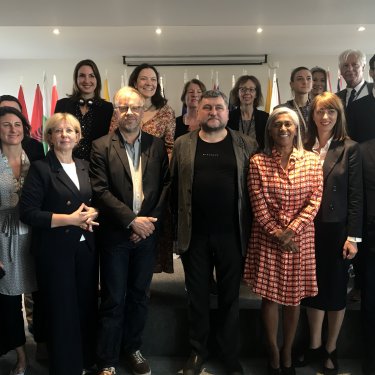RSF pays tribute to Belarusian Association of Journalists, UNESCO laureate

Reporters Without Borders (RSF) and 46 countries have paid tribute to the courage of the Belarusian Association of Journalists at a ceremony at UNESCO and have condemned the press freedom situation in Belarus, the world’s fourth biggest jailer of journalists. On this occasion, RSF has urged governments to do more to protect journalists and safeguard the right to information.
The winner of this year’s UNESCO/Guillermo Cano World Press Freedom Prize, the BAJ received this tribute to its courageous action and its exceptional contribution to the defence of press freedom during a ceremony at UNESCO headquarters in Paris on 3 June. Presented by RSF, the BAJ’s candidacy for the Guillermo Cano Prize was sponsored by 46 countries.
“RSF pays homage to the BAJ’s courage in the face of Belarus state terrorism’s attempts to silence all independent voices,” RSF Secretary General Christophe Deloire said. “The mobilisation of 46 countries in its favour has sent a strong signal but they must not stop there. The time has come to renew the mechanisms protecting journalists and to safeguard the right to information.”
RSF’s partner since 2004, the BAJ has been promoting and defending press freedom for more than 25 years in what was Europe’s most dangerous country for journalists until Russia invaded Ukraine. The BAJ has played a major role in documenting the unprecedented attacks and arrests of journalists that have taken place in Belarus since the disputed elections in August 2020.
Although formally disbanded by the Belarusian authorities on 27 August 2021, at the end of proceedings marred by irregularities, the BAJ continues to work for independent journalism in Belarus.
The Belarusian authorities’ ma are still persecuting journalists on a massive scale, and a total of 28 media workers are currently held in Belarusian jails. In the next few days, five journalists are due to go on trial on trumped-up charges ranging from organising protests to high treason, for which they could be jailed for up to 15 years.
“These are not just names and numbers,” BAJ president Andrei Bastunets said. “They are journalists and they are also close friends. Many people we know end up on trial or in jail. This is a tragedy for our country, a tragedy for Belarusian journalism. But we continue our work, despite the idea that everything has been eliminated in our country. Many of our members are still working, in Belarus or abroad. We have even expanded, and now have branches in Ukraine and Georgia… although it is true that many of our colleagues have again had to leave everything behind in Ukraine.”
Against this tragic backdrop, the support of 46 states for the BAJ and its activities in defence of independent journalism is a strong symbol that shows the importance of renewing the international commitment to this fight for press freedom.
RSF has proposed to UN secretary-general António Guterres that the UN should strengthen the effectiveness of its system for protecting journalists by creating the position of special Envoy of the UN Secretary-General for the safety of journalists. Such a special envoy would be able to develop stronger international action in order to better respond to attacks against journalists.
RSF also calls for a “reinvented multilateralism”, in which independent civil society would be more integrated, in order to develop innovative solutions adapted to new challenges, especially those of the digital age.
The New Deal for Journalism that has been proposed as part of the Partnership for Information and Democracy and the Journalism Trust Initiative (JTI), initiated by RSF, are some of the innovative ways proposed to promote independent quality journalism, reduce “information chaos” by means of democratic safeguards, and defend the right to news and information.
